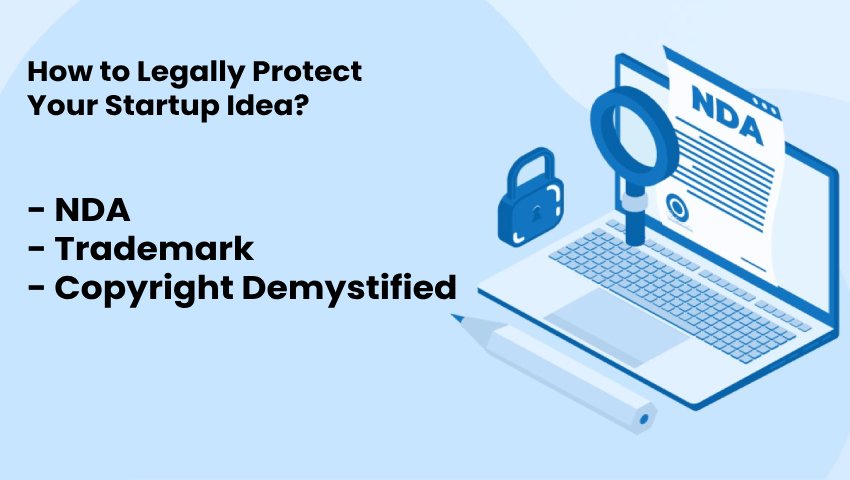
- 02/06/2025
- MyFinanceGyan
- 458 Views
- 3 Likes
- Company Law
How to Legally Protect Your Startup Idea? NDA, Trademark, Copyright Demystified
Introduction:
At My Finance Gyan, we think that a great idea is the seed of all successful startups. But in the competitive business environment of today, even if you have a unique idea, it won’t suffice—you should protect it legally. Most Indian entrepreneurs are concerned about their startup ideas being hijacked, particularly when they discuss them with prospective co-founders, developers, or investors. And rightfully so.
Legal protection doesn’t only apply to large corporations. Even in the idea phase, Non-Disclosure Agreements (NDAs), Trademarks, and Copyrights can go a long way in protecting your idea. We will briefly break down these tools, how to utilize them in India, and why you need them as a startup founder. Stay tuned by subscribing to our newsletter for more news and expert advice to protect and scale your startup!
Why Legal Protection for Startup Ideas Matters?
You may think that ideas cannot be owned—but when it comes to business, protecting your original concept is possible and highly recommended. As a founder, you’ll be sharing your idea with various people—maybe a graphic designer to help build your brand, a developer to work on your app, or even a potential investor who might back your project.
If you don’t act properly, someone might steal your idea or get ahead of you to make it happen. Worse, you may have no legal evidence or authority to prevent them from doing so. That’s why having legal protection is critical. It provides an extra level of security, indicates that you’re serious about your business, and helps establish trust with future investors or partners.
Non-Disclosure Agreement (NDA) – First Line of Defence:
NDAs are binding contracts that restrict others from revealing or misusing your sensitive business information.
Purpose:
- Safeguards sensitive information such as ideas, strategies, or financials when shared with co-founders, freelancers, consultants, or investors.
Forms of NDA:
- Unilateral: Confidential information is shared by one party.
- Mutual: Both parties commit to guarding disclosed information.
- Essential Clauses: Clearly establish what’s confidential, how long it must be kept secret, and penalties for violation.
- Legal Validity: Should be signed on ₹100 or ₹200 non-judicial stamp paper. Online templates are available, but legal counsel is advised.
- Pro Tip: Even if some investors won’t sign NDAs at the initial stages, it’s always advisable to ask.
Trademark – Protecting Your Brand Identity:
Trademarks protect your startup’s brand name, logo, or tagline from being reproduced by others in the same industry.
- What It Covers: Brand name, logos, slogans, and symbols of your product or service.
- Why It Matters: If you don’t register, you can’t sue if someone else adopts a similar brand name in your sector.
Trademark Registration Procedure:
- Search availability on the IP India portal.
- File Form TM-A online (₹4,500 for startups/individuals).
- The application is scrutinized and then published in the Trademark Journal.
- Registered in 6–12 months if unopposed.
Usage Rights:
- Use ™ upon applying, and ® when it’s registered.
Benefit:
- Creates brand credibility and offers legal protection when you grow.
Copyright – Securing Your Creative Work:
Copyright provides legal protection for original works such as code, content, pitch decks, or designs.
- What It Covers: App UI/UX, blog posts, illustrations, software code, videos, and more.
- Automatic Protection: Automatically given when original work is created and stored, but registration fortifies your legal position.
- Why Register?: Provides evidence of ownership and makes legal action in the event of infringement easier.
Registration Process:
- Submit Form XIV on the Copyright Office website.
- Upload your work and pay the fee.
- Obtain your registration certificate within a few weeks.
Limitation:
- Copyright protects how an idea is expressed, not the idea itself. One can’t take a copy of your app UI, but one can still create an equivalent app idea unless otherwise protected.
Bonus: What About Patents?
If your startup is focused on a novel product, invention, or process that addresses a technical issue, you might consider patents. Patents are issued for inventions that are new, useful, and not obvious to one who has skill in the area.
The patenting process is more involved and costly than other forms of protection, yet it can grant you sole ownership of your invention for 20 years. You can even apply for a provisional patent initially in order to shut down your idea while you prepare the full application for it.
Not all startups require a patent, but if you’re developing something in tech, medical, or engineering, it might be worth thinking about.
Common Mistakes Startups Make:
Most new founders procrastinate or overlook legal protection for reasons of cost or lack of knowledge. Some discuss their concepts too openly, assuming it is a casual conversation. Others procrastinate too long about applying for a trademark, only to discover that the name is already in use.
Omitting legal requirements early on can cost you dearly down the line. A few typical errors are:
- Failing to sign NDAs before pitching or co-founding
- Employing brand names without first investigating trademark availability
- Thinking that copyright registration is not necessary
- Not keeping records of who made what and when
Best Legal Practices for Startups:
Legal protection should be a part of the launch plan for startups. Always use NDAs when disclosing sensitive information. Register a trademark as soon as your name is established. Register important creative work such as websites, apps, and designs under copyright. Proper documentation of who made what and when should be maintained.
Also, don’t be afraid to seek the advice of a startup lawyer—it’s an investment, not a cost.
Conclusion:
Your startup idea is not just an idea—it’s the basis for your future company. And like any precious asset, it should be guarded. Legal instruments such as NDAs, trademarks, and copyrights are readily available and give strong protection in India.
At My Finance Gyan, we assist startups in making these initial steps without chaos and expense. If you specifically require help with trademark Registration, Startup Portal provides professional guidance to ease the registration process. Shield your idea today, and secure your business tomorrow.



